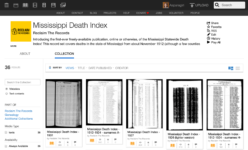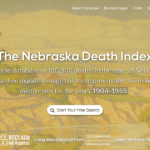 The Mississippi death index is now online
The Mississippi death index is now online
The Mississippi Death Index for 1912-1943 is now online for free public use at the Internet Archive. Some years are hard to read, with white text on a black background; for those years, we have also created alternate lighter versions of the same files, which may be more legible.
Introducing the first-ever freely-available publication, online or otherwise, of the Mississippi Statewide Death Index! This record set covers deaths in the state of Mississippi from about November 1912 (although a few counties were slow to join in) through 1943. This record set was originally compiled by the Works Project Administration (WPA), as part of their incredibly important Historical Records Survey group.
 Up until, oh, right now, the only place anyone could see or use this index was by visiting the Mississippi Department of Archives and History in Jackson, Mississippi in person, then tediously cranking through the faded and scratched microfilm rolls, or shuffling around microfiche sheets for some of the years. But now it’s all scanned and online and free to use from your own home, without restrictions or copyrights, forever!
Up until, oh, right now, the only place anyone could see or use this index was by visiting the Mississippi Department of Archives and History in Jackson, Mississippi in person, then tediously cranking through the faded and scratched microfilm rolls, or shuffling around microfiche sheets for some of the years. But now it’s all scanned and online and free to use from your own home, without restrictions or copyrights, forever!
And we at Reclaim The Records couldn’t have done this without teamwork: a dedicated genealogist who knew about the records and about his rights and reached out to us for help; two generous genealogy non-profits that helped us digitize and host these new materials; and a pool of awesome supporters and donors that enabled our work on this project. (This is you!)
Georgia Genealogist Gauges Guidelines, Gets Goods
 Enter Christopher Smothers. He’s a professional genealogist based in Georgia, specializing in the Deep South and the Eastern Shore of Maryland — and a college student, studying history. Earlier this year, he reached out to us at Reclaim The Records over e-mail and wrote that he had been researching the laws and rules that had been keeping the Mississippi state death index restricted to the Archives in Jackson:
Enter Christopher Smothers. He’s a professional genealogist based in Georgia, specializing in the Deep South and the Eastern Shore of Maryland — and a college student, studying history. Earlier this year, he reached out to us at Reclaim The Records over e-mail and wrote that he had been researching the laws and rules that had been keeping the Mississippi state death index restricted to the Archives in Jackson:
“I personally have family in Mississippi, and I can remember a time when I begin doing genealogical work and nothing was available for the region unless you went to Jackson. And I thought to myself this is unrealistic. I’ve been trying for years to communicate with someone who could release these records, however I did not know the correct terminology or legally how to go about obtaining access to them.”
What Chris also didn’t know is that everyone else had been trying for years to get those records out of the Archives, too, without success. Even when the Archives had let some organizations come in to photograph or scan other records, they still inexplicably held tight to the state death index. Other people reported that it was the state Department of Health — who claimed “ownership” of the index that was on file at the Archives — that was really holding up the show, making vaguely scary noises about ‘rules’ and ‘lawyers’ and ‘privacy’, even though all of the people in this death index were, of course, quite dead.
(We at Reclaim The Records are currently running four Freedom of Information different lawsuits against three different Departments of Health — two in New York State, one in New York City, and one in Missouri — so these stories do not entirely surprise us. We know what these agencies can be like.)
But whatever the holdup had been, it seems the time was finally right for a change, and this young genealogist pushing for his right to get copies of the records under the law was the pebble that finally launched the landslide. Chris knew about the Mississippi Public Records Act and Chris talked to the archivists and Powers That Be and eventually Chris made it happen.
So if you’re as excited as we are about these records finally going online, please make sure you send Chris a thank you, because honestly, he deserves the credit.
 So the Archives formally approved the duplication of the microfilm master reels of the death index — which, it turns out, were kept in a giant underground records vault in Kansas, which sounds almost as cool as a giant records vault built into the side of a mountain just outside Salt Lake City. But Chris, as we mentioned, is still a college student. So this is the part where we at Reclaim The Records were fortunately able to step in and take the baton and run more laps in this relay race.
So the Archives formally approved the duplication of the microfilm master reels of the death index — which, it turns out, were kept in a giant underground records vault in Kansas, which sounds almost as cool as a giant records vault built into the side of a mountain just outside Salt Lake City. But Chris, as we mentioned, is still a college student. So this is the part where we at Reclaim The Records were fortunately able to step in and take the baton and run more laps in this relay race.
Because of the continuing generosity of all our amazing donors and supporters (you guys! thank you so much!) we were able to take over the financial details of the invoice. And we paid that underground records vault for the microfilm copies. And thus, for the low, low price of $480 (eight microfilms at $60 per film), plus $5 for freight shipping, plus the priceless tenacity of a genealogist who knew his rights under the law, thirty-one years of Mississippi history were finally liberated, forever.
Then we reached out to the extremely generous folks at the non-profit organization FamilySearch, who once again (again!) stepped up and agreed to digitize these microfilm reels for us, gratis. Thank you, FamilySearch! So we mailed them the films and a few weeks later we got them back in the mail, along with a hard drive full of newly digitized images.
Then we uploaded everything we got to another great non-profit, the Internet Archive, which doesn’t charge us for all the server hard drive space or bandwidth that hosts these very large image files. Thank you, Internet Archive!
?And now they’re all online! And here they are! ?
All about the Mississippi statewide death index
Okay, so the first thing you need to know is that some of the images are hard to read. There’s really no other way to put it. But most of the years are legible, and all of them are typed up or even printed out, so at least there’s no handwriting to worry about.
And probably within a year or two, all the usual genealogy websites will have a text transcription done from these scanned images, and then we can all just type in names and get search results, maybe even get automatic hints and leaves and tree matches and whatever other techie doodads they think up.
But for the moment, we’ve just got images. And as you can see, the format and the information recorded and the image clarity can vary from year to year, a lot:
 For the parts of the index that had this white text on a black background, which was mainly used in 1925-1926 and then again in the 1930’s, we took the time to make “alternate versions” of each of those microfilms, boosting the contrast and brightness. So if, for example, the regular 1925 death index is too hard to read, you can try looking at the 1925 alternate version with lighter text, instead. You can also download every one of these images to your hard drive, if you like, and play with the image settings there.
For the parts of the index that had this white text on a black background, which was mainly used in 1925-1926 and then again in the 1930’s, we took the time to make “alternate versions” of each of those microfilms, boosting the contrast and brightness. So if, for example, the regular 1925 death index is too hard to read, you can try looking at the 1925 alternate version with lighter text, instead. You can also download every one of these images to your hard drive, if you like, and play with the image settings there.
(We should point out that a partial text-searchable version of this data does exist online, started by a volunteer genealogy group back in 2011. But they don’t have any of the images online, and only about 44,000 names done out of a few hundred thousand.)
(And we should also point out that because FamilySearch did the microfilm scanning, you can see and use the image copies on their website, too! But they don’t have the alternate/lighter versions we created for some of the years.)
I found a name, now what?
If you find a name of interest in the Mississippi state death index, you can then order a copy of the actual death certificate and learn much more information, including the person’s age at death, their parents’ names, their spouse’s name, the cemetery in which they were buried, and so on. And you have multiple choices for how to do this:
- If you need a certified copy of a death certificate, which is usually required for legal purposes, you can order one from the Mississippi State Department of Health, but it’s a little more expensive and a little slower than other methods, and you may need to prove your relationship to the deceased, even for a plain-paper “genealogy” copy.
- If you don’t really need a certified copy, you can get a scan or copy of the certificate directly from the Archives in Jackson — yes, the same place that finally coughed up the index. But they have a bifurcated rate for copies: all in-state reference requests have a $10 service fee, but out-of-state reference requests have a $35 service fee.[A brief digression: considering that the Mississippi Archives makes money by selling copies of death certificates, why were they so stubbornly resistant to providing copies of the basic index for so many years? How did they think researchers were supposed to magically know what records were available for sale in the first place? Arrrrgh.]
- Or you can just hire a friendly local Mississippi genealogist or researcher to go to the Archives and make the scan for you, and then you can skip the payment to the Archives altogether.
- Or you can fly to Jackson and visit the Archives and do the work yourself.
“The past is never dead. It’s not even past.”
Finally, we can’t help but mention that having worked with other states’ death indices for a few years now, there was something a little unusual about these Mississippi files that caught our eye.
It’s not that some years of the death index are alphabetical by surname while other years are sorted by the Soundex code of the surname; this is true, but it’s not that unusual.
No, it’s what fields they chose to extract from the certificates for the index.
Obviously one has to pick and choose the most important bits of a vital records certificate when one does the work of making an index or finding aid. For some years, the people who made the Mississippi death index gave the complete date of death, not just the year. For some years, they gave the sex of the deceased. For some years, they gave the age at death. For some years, they gave the marital status of the deceased. A small number of years, including 1930, even list the first initial of one or both of the deceased’s parents’ given names. And rarely they would fail to record the person’s given name, and would list women as Mrs. So-and-So, or very young children as Child Of.
But. They always extracted the surname and the death certificate number and the county name or code…and the race. They picked race to extract into the death index as more important than all those other fields that could help disambiguate between every John or Jane Smith in the state. And their field for race was not always a real multi-valued field, either; for some years, they just recorded either white or “non-white” [sic] as the options, to segregate the names even in the basic index, even in death.
(Other states’ twentieth century death indices generally don’t look like this.)
Mississippi’s native son William Faulkner wrote: “The past is never dead. It’s not even past.” And it’s sobering to look at these records finally online for the very first time in 2019 and see the proof right there, genealogy’s past showing up in genealogy’s present.
But we’ll end this newsletter with some words from genealogy’s future, and that would be young genealogists like Chris, who work to bring our records and our history right back out of the archives to everyone, for everyone. This is from that very first e-mail he wrote to us, when he reached out with the exciting news about possibly acquiring these records:
“Mississippi is just the start of the underserved communities of the U.S. whose records I want to help unearth so the descendants of the people who contributed to such a rich history will not forget who they are and the choices made in the past and the power of their choices moving forward.”

Documents related to this request are coming soon.
State or Vital Records Jurisdiction: Mississippi
Archive or Library: Mississippi Department of Archives and History
Law: Mississippi Public Records Act
Record Type: Death Records
Record Years: 1912-1943
Record Format: Index Only
Record Physical Format: Microfilm and Microfiche
Number of Records (Estimated): Unknown, but likely over a hundred thousand


